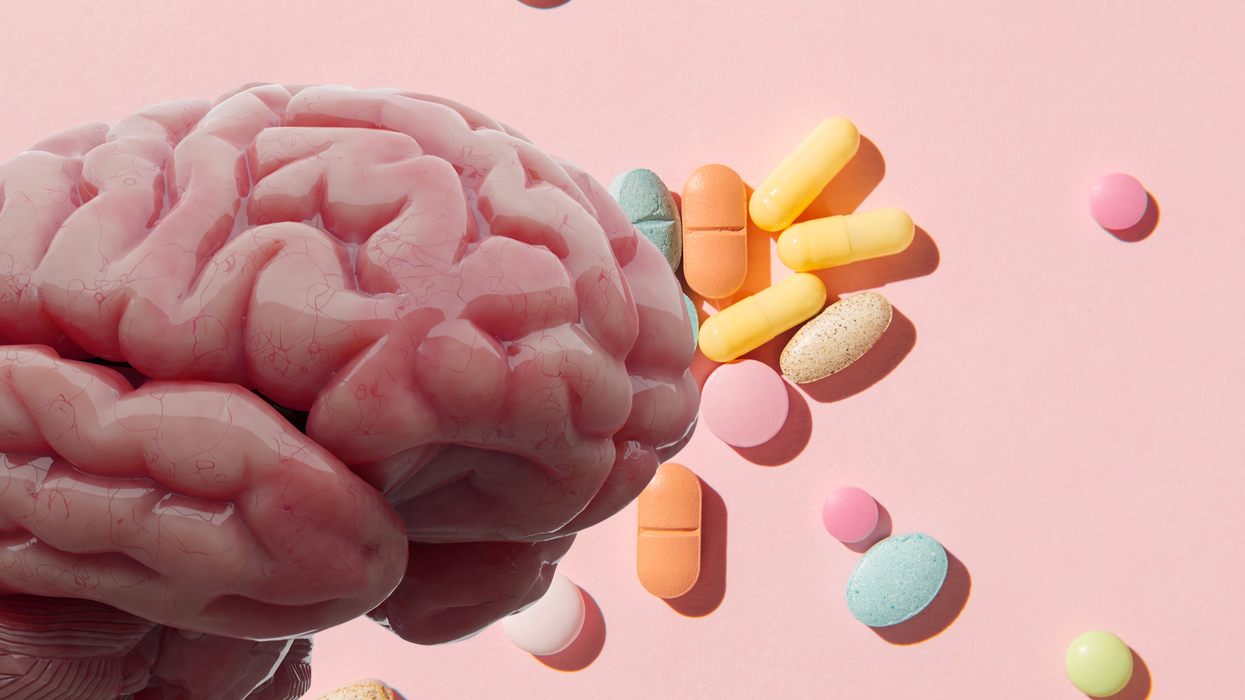The six best supplements for preventing memory loss and boosting cognitive performance in middle age

Six supplements to boost your memory and cognitive performance
|Getty Images

There's no sure-fire way to prevent dementia but you can supplement your way to better cognitive health. Here are six memory-boosting supplements backed by solid evidence
Don't Miss
Most Read
All products and promotions are independently selected by our experts. To help us provide free impartial advice, we will earn an affiliate commission if you buy something. Click here to learn more
Ageing is an inescapable part of life but that doesn't make it any easier.
Aches and pains are one thing but cognitive decline is in a category of its own.
With the threat of dementia hanging over your head, simply misplacing your keys is enough to hit the panic button. Unfortunately, there's no ironclad defence against brain decline but supplements have been shown to help.
Here are six that have been shown to boost memory and cognitive performance.
- View Deal | Shop pure L-Theanine — made in the UK — from Amazon
- View Deal | Buy one, get one half price on Vitamin D at Holland & Barrett
- View Deal | Get 10% off a 3-month supply of Magnesium 500mg at Amazon
- View Deal | Get 3-month supply of organic Ashwagandha at Amazon
- View Deal | Shop probiotic gummies with live cultures at My Vitamins
- View Deal | Buy 180 tablets of choline — made in the UK — from Amazon
L-Theanine
L-Theanine is an amino acid found naturally in some mushrooms, and green and black teas.
The compound has been linked to an improvement in mental performance and the ability to focus in some studies.
In a small study in Neuropharmacology, participants who took 100 milligrams of L-theanine before a monitored two-hour task period made fewer errors during that time than those who received a placebo.
In a 2016 study, researchers reviewed the existing research on the benefits of L-theanine and concluded that this compound could benefit a person’s mental and physical health. They noted that it seems to have neuroprotective effects, which improve brain function.
There is no established dose recommendation but studies often use daily doses between 100 and 250 milligrams.
Vitamin D
Vitamin D deficiency is linked to neurological conditions such as dementia, depression, autism and schizophrenia.
One 2017 study in Current Gerontology and Geriatric Research suggests vitamin D helps maintain cognitive function in older adults.
A unique study, published in Journals of Gerontology: Series A attempted to pinpoint how much you need to take to reap the cognitive benefits. Researchers used computers to assess the impact of vitamin D on cognitive function. The researchers evaluated three groups of women between 50 and 70 years old in a randomized controlled trial.
One group took the recommended daily dose of 600 international units (IU), equivalent to 15 micrograms, of vitamin D each day for a year.
Another group took 2,000 IU per day and the third took 4,000. All women participated in lifestyle counselling and were encouraged to lose a modest amount of weight.
The researchers found that memory and learning improved in the group that took 2,000 IU per day, but not in the group that took the higher dosage.
However, the women's reaction time showed a trend to be slower at 2,000 IU daily and was significantly slower at the higher dosage. This led the researchers to conclude that 4,000 IU a day might not be a problem for younger people but for the elderly it could compromise walking or catching one's balance to avoid a fall because their reaction time is slower.
This is in line with NHS advice, which states that you should not take more than 100 micrograms (4,000 IU) of vitamin D a day as it could be "harmful".
Magnesium
A 2022 study of over 2,500 people ages 60 and older found those who consumed the highest amounts of magnesium through food and supplements had higher scores on cognitive tests compared to those who consumed the least.
Research suggests there might be a sweet spot.
Results from the study, published in the journal Neurology, indicate that both high and low levels of magnesium may be linked to an increased risk of dementia.
However, it’s unclear whether low or high levels of magnesium increase the risk of dementia or if people with dementia have low or high levels of magnesium for some other reason.
Magnesium plays an important role in relaying signals between your brain and body.
It acts as the gatekeeper for the N-methyl-D-aspartate (NMDA) receptors, which are found on your nerve cells and aid brain development, memory, and learning
According to the Department of Health and Social Care, having 400mg or less a day of magnesium from supplements is unlikely to cause any harm.
- View Deal | Shop pure L-Theanine — made in the UK — from Amazon
- View Deal | Buy one, get one half price on Vitamin D at Holland & Barrett
- View Deal | Get 10% off a 3-month supply of Magnesium 500mg at Amazon
- View Deal | Get 3-month supply of organic Ashwagandha at Amazon
- View Deal | Shop probiotic gummies with live cultures at My Vitamins
- View Deal | Buy 180 tablets of choline — made in the UK — from Amazon
Choline
Choline is an essential nutrient that helps your brain make acetylcholine - a substance needed for memory and general cognition.
In one study of 2,000 older adults, those who consumed high amounts of choline tended to have a lower risk of cognitive decline.
An older study in rats also suggested dietary lecithin elevates choline levels.
Lecithin is a mixture of fats that are essential to cells in the human body. It can be found in many foods, including soybeans and egg yolks.
It can also be taken in supplement form.
There are currently no NHS guidelines for choline intake but a ‘tolerable upper intake’ level of 3,500mg has been suggested as for all adults.
LATEST DEVELOPMENTS
Ashwagandha
Ashwagandha is used in the Ayurvedic system of medicine to help enhance memory and reduce stress. Emerging research suggests ashwagandha may help improve cognitive function.
In a small 2017 study, published in the Journal of Dietary Supplements, 50 adults with mild cognitive impairment received either 300 milligrams of ashwagandha root extract twice daily or a placebo for eight weeks.
Those taking ashwagandha experienced significant improvements in memory, executive function, attention and information-processing speed compared to those who took a placebo.
In a 2021 study, published in the Evidence-Based Complementary Alternative Medicine, healthy adults who took 300 milligrams of sustained-release ashwagandha extract daily for 90 days experienced significantly improved memory and focus, compared to those who took a placebo.
Probiotics
Gut health is important for optimal cognitive function and general health. Your gut is your second brain and a healthy gut is a healthy body that can withstand the challenges of life.
In a 2021 study in the Journals of Gerontology Series A: Biological Sciences and Medical Sciences, 12 weeks of supplementation with a probiotic combination of Bifidobacterium bifidum BGN4 and Bifidobacterium longum BORI specifically appeared to improve brain function and decrease perceived stress in healthy older adults.
A study published by Frontiers in Aging Neuroscience found that Alzheimer's patients who drank milk made with four probiotic bacteria species for 12 weeks scored better on a test to measure cognitive impairment compared with those who drank regular milk.
It's important to acknowledge that the NHS says there's little evidence to support many health claims made about them.
But probiotics are generally considered to be safe so why not give them a try.










